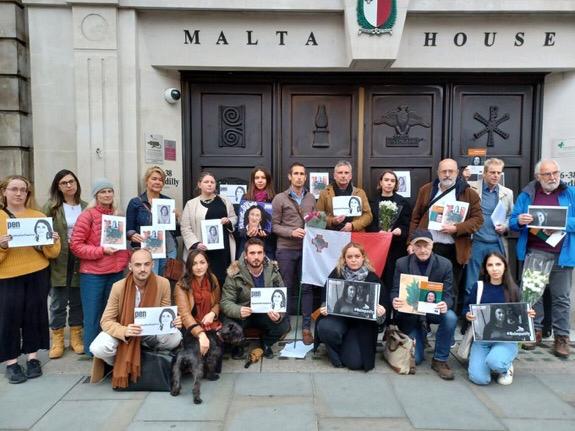[vc_row][vc_column][vc_single_image image=”117699″ img_size=”full” add_caption=”yes” alignment=”center”][vc_column_text]The following remarks were made by Caoilfhionn Gallagher, QC of Doughty Street Chambers, a member of the international legal team for the family of Daphne Caruana Galizia at a vigil on Friday 15 October 2021 at the Maltese High Commission to mark the fourth anniversary of Daphne’s assassination.
“We gather today in London to pay tribute to Daphne Caruana Galizia and honour her memory, and to stand in solidarity with her bereaved family in Malta. On this, the fourth anniversary of her assassination, I wish to say four things.
“First, it is now ten weeks since the independent public inquiry in Malta published its detailed 437-page report, finding that the Maltese State should shoulder responsibility for her death. The damning report concluded that a culture of impunity was created from the highest echelons of power within the Castille. Former Prime Minister Joseph Muscat was singled out and identified as enabling this culture of impunity, and his entire cabinet was found to be collectively responsible for their inaction in the lead up to the assassination.
“The State, the report held, ‘created an atmosphere of impunity, generated from the highest echelons of the administration inside Castille, the tentacles of which then spread to other institutions, such as the police and regulatory authorities, leading to a collapse in the rule of law.’ The report laid bare endemic corruption and fundamental structural failures, the very subjects of Daphne’s reporting.
“The Government created a ‘favourable climate’ for anyone seeking to eliminate Daphne to do so with the minimum of consequences, giving a green light to her being treated as a target. The State also failed to recognise the real and immediate risks to Daphne’s life, and failed to take reasonable steps to avoid those risks. And a myriad of other systemic failings were identified which failed Daphne, failed her family, failed journalists, and failed the Maltese people.
“And yet, 10 weeks on, we remain without a meaningful response to that report by the Maltese Government. The Government has not even released an English translation of the 437-page report – what translations you have heard or read have been provided by the bereaved family and their lawyers, not the State. Even this basic step, to commit to transparency and enable the international community to understand what happened and hold Malta to account, has not been taken.
“Second, it is now four years since Daphne was brutally murdered, in an assassination which sent shockwaves across Europe. Daphne was a brilliant, brave, dogged investigative journalist, who honed her craft over decades, often sitting at her kitchen table where she spent her last few hours with her son Matthew.
“She was isolated in those final months and years, facing multiple oppressive law suits, threats of financial ruin, abuse on the street and online, dehumanising and misogynistic images circulating. And yet, there has still been no unequivocal acceptance of the horrors that she faced, let alone an unequivocal apology for it, from Malta.
“Third, I ask what should Malta now do? Daphne’s assassination followed decades of abuse. It occurred within a climate of impunity and negative rhetoric directed against Daphne and other journalists in Malta. Today, her family calls upon the Government of Malta to unequivocally condemn the climate of impunity and negative rhetoric identified by the public inquiry, which dehumanised her and fuelled her murder.
“There must be root and branch political and legislative reform.
“And above all, Daphne’s family must have meaningful involvement in what comes next. The family counts on the Prime Minister to consult with them and civil society on the foundational principles for the independent committee of experts due to be appointed following the inquiry report, and on Terms of Reference to implement those principles. This consultation process is an essential first step before the proposed roles of committee members are formulated.
“Fourth, I ask what should the international community now do? It is fitting that we are standing here in central London. Many of those threatening legal letters which bombarded Daphne in the final months and years of her life came from London law firms. Whilst that climate of impunity festered in Malta, the world stood idly by. The UK and other countries across Europe ignored what was happening under their noses, and left Daphne to her fate.
“On 6 October 2017, weeks before her death, Daphne wrote on her blog, ‘in journalism, as in many areas in life, you sometimes find the back-up you need a little too late.’ Well, one week ago the Nobel Peace Prize was awarded to two investigative journalists, one of whom, Maria Ressa, I am honoured to represent. The Norwegian Nobel Committee recognised their efforts to safeguard freedom of expression, ‘a precondition for democracy and lasting peace.’
“The awarding of the Nobel Peace Prize to journalists is a welcome recognition of the bravery of journalists doing what Daphne Caruana Galizia did so brilliantly – holding the powerful and the corrupt to account. This is important back-up from the international community, albeit far too late for Daphne. In the decades leading up to her assassination, the world failed to act. They failed to act in 2017. Four years on, it is long past time for other States who clam to believe in the importance of freedom of expression – the UK, Council of Europe Member States, EU Member States, every single country which has signed up to the Media Freedom Coalition – to act. They failed Daphne then. Now, they must hold Malta to account and ensure the change Daphne’s family and Malta need and deserve comes to pass.”
The vigil for Daphne was co-sponsored by the Maltese community in London, ARTICLE 19, the Association of European Journalists, the Commonwealth Journalists Association, Index on Censorship, PEN International, Reporters Without Borders, and Transparency International-UK.
[/vc_column_text][/vc_column][/vc_row]






